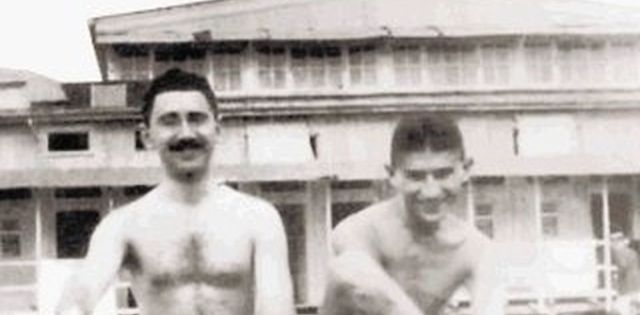During the summer of 1911, Franz Kafka and his friend Max Brod took a railway journey through Switzerland and France. While they were hanging out in Lugano, Switzerland, Kafka hit on a novel notion for “reforming” the traditional staid travel guidebook. His proposed series would be called Billig or On The Cheap and would compete with old school guides such as Baedeker and Murray’s. Kafka and Brod drafted notes for the budget guidebook series proposal. Unfortunately, the project never got off the ground, but we have the notes thanks to Kafka biographer Reiner Stach.
On the Cheap through Italy, On the Cheap through Switzerland, On the Cheap in Paris—On the Cheap in the Bohemian Spas and in Prague
Can be translated into every language.
Motto: Just Dare.
Our democratic age has already provided all of the conditions for easy, universal travel, but this has gone practically unnoticed. Our task is to collect this information and make it known in a systematic fashion.—Until now, practical inquiries and practical advice (Berliner Tageblatt [Berlin Daily]) from friends: stray comments, off-hand, quickly forgotten—a few very useful things, as we can all attest. Very little about this in the guides. A weak effort in this regard is the * in Bädeker and the rating “praised”—often disappointing.
What does “on the cheap” mean.—Many nuances. We distinguish ourselves from the palatial hotels and the gaudy, gauche middle class.— Also from below.—We address ourselves to those who consider travel too expensive, either mistakenly or because they have received poor advice, and who remain in the regions near their own cities (which are pretty in and of themselves, but already familiar). We want to provide information about other destinations that are just as affordable as these summer resorts—possibly even including transportation costs.
And to those who dare to travel, but whose travels are spoiled by the math and calculations—and (pardon!) to those who are ripped off.—Until now, the risk of accidentally falling for a scam has always had to be taken into account, and that has often been blamed on the country. Italy, Paris. So we will also improve the reputations of the countries.—Better relations between nations.
The educational aspect—energizing the whole person.
Only poorly oriented travelers are ripped off.
The same pleasure for less money. Consommation in Monico.
II
Precision, limitations. Travelers should be spared the choice.—A route for 400, 500 francs, etc.
Principle of group travel, but solo. Compare to “Teach Yourself” pamphlets.
No comprehensive geography, only routes.
We only name one hotel, and others in descending order in case this one is full.
If tramway is available, we do not include the carriage. We recommend a precise time for the trip.
Equally simple: Doctors …
[The following in Kafka’s hand] Not quick or slow travelers, but a certain middle group. Detours are easier, since additions can always be made to a precise plan.
Exact tipping amounts.
[In Brod’s hand again] Not pedantic: e.g. we recommend tipping the lifeguard—telescope on the Rigi—
About the routes: nothing is repeated. Only one cable car ride, but the best one!
Excerpt from the Railway Courier. What to take on the trip?
III
We offer more. The brief “General Section” in other guides.
Clothing.
Bordellos. Warnings against con men. (N.B. The candor of our guide.)
Souvenirs.
Shopping on the cheap e.g. silk in Italy; pineapples, madeleines, oysters in Paris.
No fear of the wrong currency.
Free concerts.
Cheaper days (e.g. art galleries) figured in after expensive voyages. Where to get free tickets like a local.
Steamers, second class.
No fear of the 3rd class in Italy. Local color.
Reform of country and city maps?
Explanation of casinos, losses.
Free maps in travel bureaus, criticism of them in our guides, the rest can be believed.
III. cont.
What to do on rainy days. Or possibly on the last day.
Art gallery, on the cheap day. Only a few important pictures.
But in thorough detail (like Kunstwart magazine), educational.
Good theater seats on the cheap, otherwise only known to habitués. Disembarking from the steamer.
IV
Recommended hotels checked by an organization.
We take care of training the authors, reviewing their texts, doing spot checks.
N.B. How is Baedeker organized?
Brochures with updates for 10 pfennig, ever other year or so, 5 vouchers in the books.
Caution against postcards, limited to the 12 enclosed (?)
V
Language guide, because knowing the language saves a lot of money.
Editions with and without language guide, for people who know the language.
Our principle: It is impossible to completely learn a language. One should be content to learn a sufficient amount with a minimum of effort. More sufficient than speaking the language poorly after studying it in depth and having to think about rules.—Infinitives paired together.—200 words.—A sort of Esperanto.—Hand gestures in Italian.—Pronunciation in depth.—No barriers to further learning.—French by us.—The most important things about Swiss dialect.
Buy one On the Cheap.
VI
Layout.



